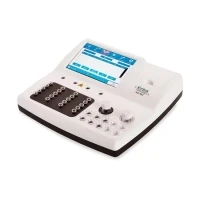
ECL 412 Four Channel Coagulation Analyzer Machine
The ECL 412 Four Channel Coagulation Analyzer is designed to facilitate efficient, high-precision coagulation testing in clinical and laboratory settings. Here’s a detailed look at its features, benefits, and considerations:
Key Features:
1. Four-Channel System:
- Simultaneous Testing: Allows the analysis of up to four different samples or tests at the same time, enhancing laboratory efficiency and throughput.
- Versatility: Supports multiple coagulation assays simultaneously, making it suitable for busy clinical environments.
2. Coagulation Assays:
- Common Tests: Includes assays such as Prothrombin Time (PT), Activated Partial Thromboplastin Time (aPTT), Thrombin Time (TT), and Fibrinogen levels.
- Specialized Tests: May offer additional or customizable coagulation tests depending on the specific configuration and laboratory requirements.
3. Automation and Precision:
- Automated Procedures: Automates sample handling, reagent dispensing, and test execution, reducing manual errors and ensuring consistency.
- High Accuracy: Employs advanced detection technologies (e.g., optical or electrochemical methods) for precise measurement of coagulation parameters.
4. User Interface:
- Touchscreen Display: Features a user-friendly touchscreen or control panel for easy navigation and operation.
- Software Integration: Includes integrated software for data management, result analysis, and connectivity with Laboratory Information Systems (LIS).
5. Calibration and Maintenance:
- Automated Calibration: Regular calibration routines are often automated, with prompts to ensure accuracy and performance.
- Maintenance: Provides guidelines for routine maintenance and cleaning to ensure optimal operation and longevity of the device.
6. Connectivity and Data Management:
- Data Storage: Capable of storing a large amount of test results and patient data, facilitating efficient data management and retrieval.
- LIS Integration: Connects with laboratory information systems for seamless data integration and reporting.
Applications:
- Clinical Laboratories: Ideal for use in hospitals and diagnostic labs to manage patients with bleeding disorders, thrombosis, or those on anticoagulant therapy.
- Research: Useful in research settings for studying coagulation mechanisms and disorders.
